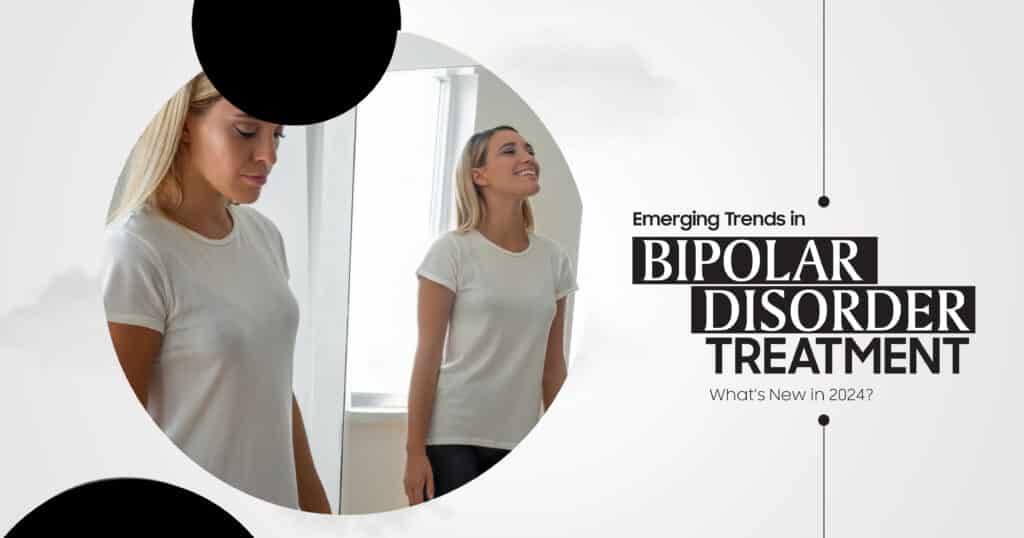Introduction
Bipolar disorder is a psychological health condition characterized by extreme mood swings that affect millions worldwide. As our understanding of this condition deepens, so do the treatment options. In 2024, significant advancements and emerging trends in bipolar disorder treatment are offering hope and improved quality of life for those affected. This article explores the latest developments, including new medications, therapeutic approaches, and technological innovations.
Understanding Bipolar Disorder
Before diving into the latest trends, it’s crucial to understand what bipolar disorder entails. Bipolar disorder is typically categorized into Bipolar I, Bipolar II, and Cyclothymic Disorder. Each type involves varying degrees of manic and depressive episodes:
- Bipolar I: People with Bipolar I experience very intense manic symptoms that last at least six to seven days or are severe enough to require immediate hospital care. They also have depressive episodes that usually last at least two weeks.
- Bipolar II: This type involves a pattern of depressive episodes and less intense manic episodes, known as hypomanic episodes, but not the full manic episodes seen in Bipolar I.
- Cyclothymic Disorder: Individuals with this disorder have periods of hypomanic and depressive symptoms lasting at least one to two years. However, these symptoms are not severe enough to be classified as full hypomanic or depressive episodes.
Understanding the different bipolar disorder types is essential for accurate diagnosis and treatment planning.
Advances in Pharmacological Treatments
Novel Medications
Glutamate Modulators
Recent research has highlighted the role of glutamate, a neurotransmitter, in bipolar depression. New medications targeting glutamate receptors are showing promise in stabilizing mood swings more effectively than traditional treatments.
Ketamine and Esketamine
Initially used as anesthetics, ketamine and its derivative esketamine have gained attention for their rapid antidepressant effects. In 2024, their application in treating bipolar depression, especially for those resistant to conventional therapies, is expanding. These drugs represent a breakthrough in treatment-resistant depression and are being integrated into clinical practice guidelines.
Cannabidiol (CBD)
Cannabidiol, a non-psychoactive component of cannabis, is being explored for its potential mood-stabilizing properties. Early studies suggest CBD may help reduce the frequency and severity of mood episodes in bipolar mania. This adjunctive treatment offers a new avenue for managing acute mania and other mood disorders.
Improved Mood Stabilizers
Extended-Release Formulations
Extended-release formulations of existing mood stabilizers, like lithium and valproate, are enhancing patient compliance and reducing side effects by maintaining steadier drug levels in the bloodstream. These pharmacologic treatments are essential for long-term management.
Combination Therapies
Combining mood stabilizers with other medications, such as atypical antipsychotics or antidepressants, is becoming a more personalized approach tailored to the individual’s specific symptoms and genetic profile. This combination therapy can be more effective for treating mixed episodes and affective disorders.
Second-Generation Antipsychotics
Second-generation antipsychotics are increasingly used as first-line treatment for bipolar disorder due to their efficacy and reduced risk of side effects compared to older antipsychotics. These medications are beneficial for managing both manic and depressive episodes.
Psychotherapeutic Innovations
Digital Cognitive Behavioral Therapy (CBT)
Digital CBT platforms, accessible via smartphones and computers, offer convenient and cost-effective therapy options. These platforms use AI to personalize therapy sessions, track mood changes, and provide immediate crisis interventions. This represents a shift towards evidence-based guidelines in clinical practice, aiming to improve the quality of life for bipolar disorder patients.
Mindfulness-Based Cognitive Therapy (MBCT)
MBCT combines cognitive therapy with mindfulness strategies to help individuals stay present and avoid relapses. Its effectiveness in preventing depressive episodes in bipolar disorder is gaining recognition. This therapy is becoming a key component of holistic treatment plans.
Psychedelic-Assisted Therapy
Psychedelics like psilocybin and MDMA, administered in controlled settings, are being investigated for their potential to reset neural pathways and provide long-term relief from mood disorders. These treatments are still in the experimental stage but show significant promise.
Technological Innovations in Treatment
Transcranial Magnetic Stimulation (TMS)
TMS, a non-invasive procedure that uses magnetic stimulation to stimulate nerve cells in the brain, is gaining traction as a treatment for bipolar depression. It offers an alternative for patients who do not respond to medication. Studies, such as those published in Lancet Psychiatry, highlight its effectiveness in managing treatment-resistant bipolar depression.
Neurofeedback
Neurofeedback, a biofeedback that trains individuals to alter their brain activity, is emerging as a tool for managing mood swings. By providing real-time feedback, patients can learn to regulate their brain functioning and reduce symptoms. This technology is being evaluated in various observational studies.
Wearable Technology
Wearable devices that monitor physiological markers like heart rate and sleep patterns are being integrated into treatment plans. These devices help track mood patterns and trigger early interventions, potentially preventing full-blown episodes. The integration of wearable technology aligns with the International Society for Bipolar Disorders’ guidelines on leveraging technology for better patient outcomes.
Electroconvulsive Therapy (ECT)
ECT remains a viable option for severe cases of bipolar disorder, particularly when other treatments have failed. This method is effective for rapid mood stabilization and is considered for acute episodes and treatment-resistant depression.
Lifestyle and Holistic Approaches
Nutritional Interventions
Omega-3 Fatty Acids
Research shows that omega-3 fatty acids in fish oil can help stabilize mood. Supplements and dietary changes are recommended as part of a comprehensive treatment plan.
Probiotics and Gut Health
The gut-brain axis is a growing area of interest. Probiotics and dietary changes aimed at improving gut health are being studied for their potential impact on mood and mental health. A systematic review and meta-analysis highlight the promising effects of gut health on managing psychiatric disorders.
Exercise and Physical Activity
Regular physical activity is also known to have a positive impact on mood. Exercise regimens tailored to individual preferences and capabilities are being integrated into bipolar disorder treatment plans. This approach addresses the economic burden associated with long-term care by improving overall health outcomes.
Sleep Hygiene
Maintaining a regular sleep schedule is essential for managing bipolar disorder. New strategies, including light therapy and sleep-tracking technologies, are helping patients achieve better sleep patterns. Addressing sleep hygiene is crucial, as highlighted in a previous study on the effects of sleep on mood disorders.
Emerging Research and Future Directions
Genetic and Biomarker Research
Advancements in genetic research are revolutionizing personalized medicine. By identifying genetic markers linked to bipolar disorder, treatments can be customized to individual needs, enhancing effectiveness and minimizing side effects. Studies by McIntyre RS, Berk M, and Nierenberg AA are leading the way in this area.
Early Detection and Intervention
Early detection of bipolar disorder through genetic and biomarker screening can lead to earlier intervention and better long-term outcomes. Research is ongoing to develop reliable screening tools. The work of Goodwin GM and Ketter TA is pivotal in this field.
Patient-Centered Care
The shift towards patient-centered care emphasizes the importance of involving patients in treatment decisions. This approach leads to better adherence to treatment plans and improved overall outcomes. Studies by Vieta E and Malhi GS support the effectiveness of this approach.
Conclusion
Bipolar disorder treatment is rapidly evolving. The emerging trends in 2024, from novel medications to technological innovations and holistic approaches, offer new hope for individuals living with bipolar disorder. As research continues and our understanding deepens, these advancements promise to improve the quality of life and prognosis for those affected by this challenging condition.
By integrating psychotropic medications and clinical practice guidelines, and considering the effects of lithium and other mood stabilisers, treatment plans are becoming more effective and personalized. As highlighted in Mol Psychiatry and studies by Yatham LN and Kessing LV, the future of bipolar disorder treatment is promising, aiming for better management of both unipolar depression and bipolar disorder.





